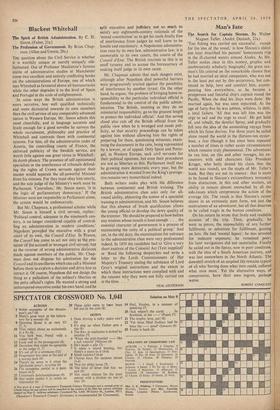Man's Fate
'THE fishing was carried out successful: except for the loss of the vessel,' is how Slocum's eldest son later described his parents' honeymoon trip in the ill-charted waters around Alaska. As Mr. Teller makes clear in this modest, graphic and unobtrusively scholarly biography, the great sea- man's life centred on the remarkable chance that he had married an ideal companion, who was not in the least put out by this occurrence, but con- tinued to help, love and comfort him, accom- panying him everywhere, as he became a prosperous and forceful ship's captain round the Pacific. When she died his 'days were done.' He married again, but was soon separated. At the age of forty-five he was jobless, wifeless, in debt, a total failure. 'All that was left him was the urge to sail and the urge to excel.' He got hold of, and rebuilt, the derelict Spray, and gradually fell into the idea of the astonishing voyage from which his fame derives. For three years he sailed alone round the world in the thirteen-ton oyster- boat, a feat (though it has since been repeated a number of times in rather easier circumstances) which remains truly phenomenal. The adventures he ran into, on this and other voyages, his en- counters with odd characters (like President Kruger, who hotly denied his claim that the world was round), are the staple of Mr. Teller's book. But they are not its essence : that is more to be found in Slocum's extraordinary immunity from distraction, in this and other matters, an ability to remain almost untouched by all the side-issues which compromise the action of the average life. The result is that Slocum's career shows in an extremely pure form, not just the motivations of an adventurer, but all that deserves to be called tragic in the human condition.
On his return he wrote that lively and readable account of the trip. Then, gradually, he went to pieces, the impossibility of any further fulfilment, or substitute for fulfilment, gaining on him. He had 'mental lapses'; he was arrested for indecent exposure; he remained poor; his later navigations did not materialise. Finally he sailed out in the Spray, now in poor condition, with the idea of a South American journey, and was lost somewhere in the North Atlantic. The downhill stretch of an emptied life remains typical of all who 'having done what men could, suffered what men must.' Yet the alternative ways, of compromise, have their own regrets, perhaps worse.
ROBERT CONQUEST






































 Previous page
Previous page